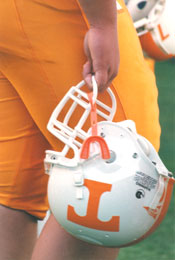
As a teacher and parent, Stefan Duma (’95) is tasked with improving the minds of American youth, an obligation he has taken quite literally.
Duma, who won the prestigious Torchbearer award while a student at UT, is professor and department head of biomedical engineering at Virginia Tech. He has won national acclaim for his work on head injury mechanics, specifically his research involving the impact of car accidents on pregnant women and fetuses, and the safety of adult and child football helmets.
Duma says his research on car accidents was at least partly inspired by his own wife’s pregnancy, which prompted him to think about ways to protect pregnant women and fetuses from injury in automobiles. It is believed that 300 to 1,000 fetuses die in car accidents each year, and car crashes are the single largest cause of death for pregnant women.
In recognition of his work with virtual crash test dummies, Duma was named in 2006 to Technology Review’s annual list of “35 Innovators Under 35.” One of Duma’s major innovations in the field was his role in the creation of the first computer model of a pregnant abdomen. Using this model, researchers can see what happens inside the abdomen during an accident and test different ways to improve safety restraints to minimize damage.
“Our goal is to reduce the risk of injury to the woman and fetus,” Duma says. “During an accident, the risk of fetal loss is eight times greater than the risk of a child dying in a child seat. We worked with the auto industry to help develop better restraint systems just for pregnant occupants.”
Duma’s more recent work centers on a topic he became interested in while playing flag football at UT: helmet mechanics.
“On the team, I played with a guy named Brett Carter, who was SGA president at the time,” he says. “I remember talking to Brett about how to make better sports equipment. That helped me move down the path toward biomechanics and making better and safer helmets.”
Earlier this year, Duma introduced the National Impact Database, the world’s first assessment of adult football helmet safety, which includes data on helmets for players in high school, college, and the NFL. The database made headlines on ESPN and in The New York Times, and it has proved popular with coaches.
The database ranks helmets on a star rating system, with five stars denoting the highest safety rating and one star the lowest. Helmets were tested in the lab using a series of drop tests, and an equation (called the Summation of Tests for the Analysis of Risk, or STAR) was developed to assess their performance. Duma says he received no compensation from manufacturers for the study.
Duma has expanded his research to address helmet safety for young children in elementary and middle schools. He notes that his work will have the greatest effect overall on children and young adults through high school, as they represent by far the largest share of the consumer market for football helmets.
Duma continues to conduct his football helmet–related research, but he also is expanding this work to the field of head injury in the military. Much of the data on blunt impact that he found in his helmet work can be applied to injuries resulting from blast loading. Through this research, Duma hopes to develop better restraint systems to reduce the risk of brain injury.

1 comment
Meredith McGroarty its a good article and I found Duma research is very good we must conduct such type of research to reduce injury.
Comments are closed.